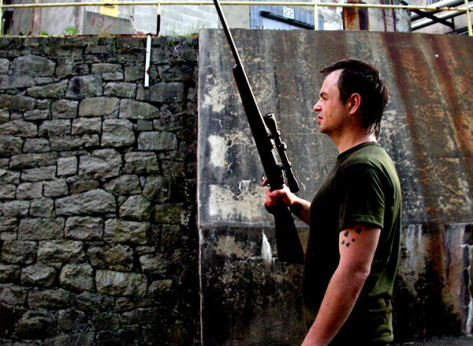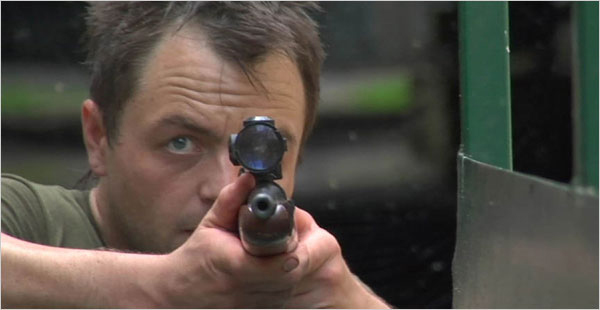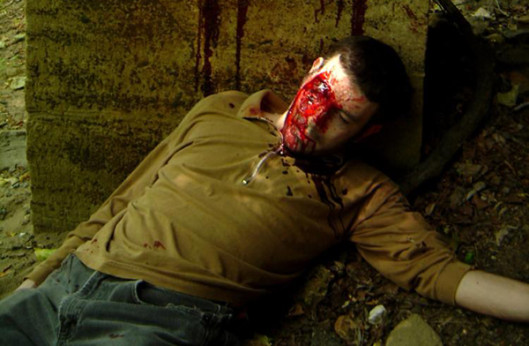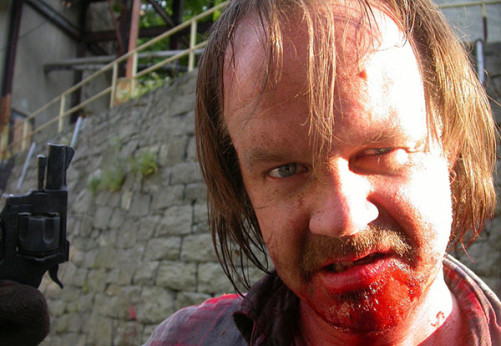Trigger Man
Dir. Ti West (2007 80 min, HVX, 1.85)
Reggie Cunningham, Ray Sullivan, Sean Reid

Inspired by true events… The story of three hunters who mysteriously became the hunted.
VARIETY
Robert Koehler JUNE 29, 2007
Hunters become the hunted in Ti West’s smartly compact and radical survival thriller, “TriggerMan.” As distinct from his smart horror debut, “The Roost,” as it surely is from his in-the-works studio debut, “Cabin Fever 2,” West’s pic grafts anti-narrative cinema conventions — sustained real-time shooting and disdain for overt plot — onto an action-adventure template. Results are so pared to the bone that the swift ending comes as a shock, and then, in retrospect, as just the right exit. Fine fest tour should broaden to non-U.S. shores, while crafty distribs could find B.O. targets in specialized hunts and focused vid volleys.
After a portentous opening shot of the New York skyline, Gotham buddies Reggie (Reggie Cunningham), Ray (Ray Sullivan) and Sean (Sean Reid) pile into an SUV for a hunting trip. Right off the bat, the film is invested less in Reggie’s apparent problems with a needy (off-screen) g.f. than the sheer ecstasy of leaving the city behind for the sun-dappled splendors and vast silences of the forest. West pointedly observes that the guys aren’t exactly Thoreaus when it comes to venturing into nature; when they’re not teasing Reggie about being “pussy-whipped,” they’re itching to break out the brews. Sean has organized the day, and firmly instructs them on the proper use of their bolt-action rifles, complete with scopes. This alone conveys the queasy sense that Reggie and Ray are going out in the woods with no real idea what they’re doing. “Trigger Man” risks everything in the first 30 minutes — including losing impatient auds altogether — by rightly insisting on plunging the viewer into the experience of hunting, which is 99% walking and waiting and keeping absolutely silent, and perhaps 1% action. Idle minds may conclude they’re watching some “Blair Witch”-y redo or a “Dudes Do Deliverance” revision, but that would miss the pic’s marvelous sense of time and space, seemingly empty of purpose yet steadily building tension. Reggie gets some newbie luck by eyeing a deer, but becomes distracted, and the rest of the day (marked by time markings in a variation on the device in “The Shining”) appears to be an elaborate excuse for drinking. Out of nowhere, as Sean is preparing to urinate at the edge of a cliff, he’s killed by a bullet. Reggie and Ray dash away, but soon, at a creek bed, Ray is gunned down by a single head shot. Reggie realizes he’s being targeted by a sharpshooter, likely stationed at a nearby abandoned factory. Though his decision to investigate further may seem like a death wish, it also feels like the act of a city guy desperate to avenge his friends’ murders.
After a remarkable sequence involving a lone female jogger, Reggie stalks the cavernous factory site, suggesting that “Trigger Man” could easily spin off a vidgame. Contrast between the spooky industrial setting and the sylvan woods surrounding it is stunning, though not as stunning as the ending, which comes upon Reggie and auds with the rude closure life sometimes provides. Nonpro thesps work naturally in front of West’s camera, with none of them straining for theatrics. In what’s starting to become a ghoulish inside joke for West’s films, his mentor and key backer — American indie horror specialist Larry Fessenden — is killed off, just as he was in a bit part in “The Roost.” West, operating with a tiny crew, covers Gotham, the woods and the factory with a sometimes insanely frenetic camera that goes overboard on herky-jerky moves and stuttering zooms. Pic doesn’t need such touches, but the long patches of silence tend to balance it out. Composer Jeff Grace comes up with one of the eeriest scores in recent genre pics.
TV GUIDE
Maitland McDonagh 2007
Writer, director, producer, cinematographer and editor Ti West’s ultra low-budget follow-up to his debut feature, THE ROOST (2005), is a stripped-down story of hunters who become the hunted. Scruffy New York City pals Reggie (Reggie Cunningham), Sean (Sean Reid) and Ray (Ray Sullivan) get together for a day-long hunting trip in Delaware, though it quickly becomes clear that only Sean knows anything about hunting. The outing is basically an excuse for them to get away from their girlfriends and drink beer in the great outdoors. Sean supplies the guns — bolt-action rifles with scopes — walks them through weapons-handling 101, hands them their orange safety vests and leads the way through the woods. There’s some ribbing and a lot of walking; Reggie actually spots a deer, but fails to take a shot — that’s the cue to break out the beer and rehash the nonevent. And then Sean strolls over to a cliff to urinate and drops, nailed by a bullet between the eyes. What began as a lazy day of slacking in the woods becomes a desperate fight for survival that pits a pair of woefully unprepared city boys against a sociopathic sharpshooter. Much of the film unfolds in real time, and for the first half hour West makes the nervy decision to show what hunting is really like: a lot of standing around and waiting. He also shoots long sequences without dialogue, letting the sound of running water and rustling branches dominate the soundtrack. But stick with it: Once the story goes DELIVERANCE (1972), it’s a nail-biter, and the minimalist aesthetic is an asset rather than a liability — the handheld follows shots that lend a you-are-there authenticity. The film is all panicky anxiety and no frills, right down to the grim, 11th-hour cameo appearance by indie filmmaker Larry Fessenden (HABIT, THE LAST WINTER), who served as producer.
NEW YORK TIMES
Jeannette Catsoulis OCTOBER 17, 2007
THE MOVIE BOY
Dustin Putman OCTOBER 2008
Writer-director Ti West is one of this decade’s best-kept secrets in genre filmmaking. With just two movies—as of this writing, a third and fourth are on the way—he has proven that, when it comes to generating the kind of quietly simmering, armrest-clenching suspense he so brilliantly ratchets, there is simply no one better than him working today. High praise, certainly, but the fact that West has thus far been able to achieve breathless levels of intensity while working with budgets that would make a shoestring look thick is quite astounding. His first feature was 2005’s “The Roost,” a savvy vampire story involving a rustic barn and bats galore that put me on edge and made me jump out of my seat throughout. The more-realistic, just-as-frightening “Trigger Man” is even better, a taut-as-a-vise-grip sophomore effort that is significant of anything but a slump. “Trigger Man” should become a mainstay example of how to pull off minimalist horror. With the sharpness of a woodchipper blade and the precision of a seamstress, director Ti West has taken his barebones screenplay—dialogue could probably be compiled together and fit on two script pages—and worked out of it one of the creepiest lingering atmospheres in recent years. A cello- and percussion-based music score by Jeff Grace meticulously underscores the images, making even the simplest shots of people walking through the woods or sitting on logs seem terrifyingly threatening. The crap hits the fan in the second half of “Trigger Man,” but it is before this, just in the way Ti West (who also acts as cinematographer and editor) naturalistically sets up the locations and teases the viewer with the possibility of what might occur to the characters, that the film works just as well.Using an unhurried, observational cinema verité style, Ti West wraps the ADD-free viewer around his finger like a slowly twisting rubber band that starts cutting off circulation. The film opens with the Manhattan skyline, the bricks and steel of society’s industrialization at odds with a somewhat similar-looking but very different building that appears later. Sean (Sean Reid), late-20s, drives into the city to pick up old friends Reggie (Reggie Cunningham) and Ray (Ray Sullivan), whom he hasn’t seen much of since their lives went in different directions. The three of them head to a woodsy stretch in Delaware for a day of hanging out and hunting for bucks. The slowness of sitting around waiting for something to happen and the unspoken truth that things have changed between them leads to monotony and temporarily flared tempers. Only minutes after the strike of noon, a gunshot will be heard in the vicinity, blood will splatter on Reggie’s face, and their presumptions of seclusion and safety will abruptly and cruelly be shattered. Meanwhile, through a clearing in the forest, across a reservoir, looms a long-abandoned factory, its seemingly decrepit desolation quite possibly not so desolate, anymore. “Trigger Man” seems like something Gus Van Sant might have made if his forte was tension-driven thrillers. Sharing the deliberate pacing of Van Sant’s recent exhilarating experimental work—2003’s “Elephant,” 2005’s “Last Days,” 2008’s “Paranoid Park“—director Ti West takes his time and allows seemingly authentic life to unfold on camera. By doing this, he is able to capture the subtleties of person-to-person interaction and the intimacy of the human condition with unbatted eyelashes and a truthful clarity. Additionally, West’s three central actors, all of them either relative novices or first-timers, benefit from their inexperience. Told to just exist on screen and forget about over-the-top theatrics, the performers dodge artificiality. “Trigger Man” may be slow-paced from an action standpoint, but don’t let that fool you; it’s as ruthless and nerve-jangling as any motion picture from this year or lastWhen more bodies turn up—whoever is shooting, it is clear he/she/they have been doing it for a while—a distraught Reggie finally does get the courage to edge his way toward the building. The climax—twenty minutes of disquieting apprehension, told in only a handful of camera shots and no dialogue—is so effortlessly orchestrated and yet simplistic at the same time that one has to wonder why most big-budgeted horror films have such trouble being the least bit scary. This one delivers all you expect from a genre pic in spades, and it is only in the culminating moment where the shooter is revealed that the pressure diffuses a little. Since the movie is not about who is committing the crimes, but about the very fact that crimes of this cold-blooded nature can, and are, happening, it was not necessary for Ti West to give the shooter a face. That’s beside the point.Early on, as Reggie, Ray and Sean reach their destination and slip on orange hunting vests, they take this precaution as a way of keeping sure that other hunters in the area do not mistake them for prey. The irony is that this is arguably the very reason they transform into the hunted, the garish material standing out and acting as an easy target for a psychopath with a gun. As a horrified Reggie sees both of his companions struck down and fears even moving an inch lest he make himself an easy shot, it is the mere potential that something is about to happen to him at any moment that raises the viewer’s blood pressure. And, when Reggie suspects the culprit is lurking over at the dilapidated factory, an unseen force of evil who has almost taken on the role of God’s eye, one shudders at the very thought. As much as Reggie and friends Sean and Ray are the leads, it is the factory itself that is the most unforgettable character. An inanimate construction symbolizing the inexplicable darkness of human nature and the world at large, it stands over the proceedings, silent, daring Reggie to come closer. .
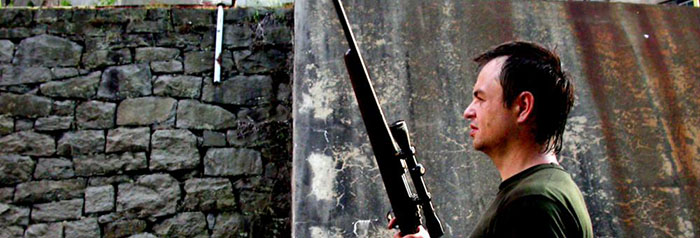

REGGIE CUNNINGHAM, “Reggie” – IMDB: Reggie Cunningham is an actor, known for Trigger Man (2007) and Likeness (2009).
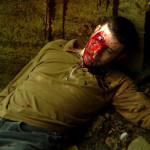
RAY SULLIVAN, “Ray” – IMDB: Born in the Tri-State area, Ray spent his teenage summers playing baseball. After practice, he was always on the Boardwalk. Ray’s teammates would usually find him there, trying to pick up older women. It was around this time that Ray first discovered music and would spend long nights developing his skill on the drums. Eventually, Ray went to university in Georgia on a baseball scholarship. He was headed for the minor leagues until a knee injury got in the way. When he re-injured it, he no longer had to make a decision between baseball and music, the decision was made for him. He came back to New York, moved to the City, and quickly gained a reputation as a gun for hire. Part-time actor, part-time model and full-time musician, Ray hardly slept. He started playing the drums for several bands, among which was the Lower East Side hipster band, “Some Action.” After catching him on the drums, ex-“Transvision Vamp” singer Wendy James offered him a job playing for her newest band, Racine. He accepted and, after recording, went on tour with them through England and Europe. Shortly after that, he met the Brothers Grimm, the guitarist and bassist from “Lower 48.” They introduced Ray to Gray Madder and Ray has been a contributing member of Lower 48 ever since.

SEAN REID, “Sean” – IMDB: Sean Reid was born on April 20, 1980 in Ridgewood, New Jersey, USA. He is known for his work on The Innkeepers (2011), The Roost (2005) and I Sell the Dead (2008).
Larry Fessenden, “Henchman”
Heather Robb, “Jogger”
James Felix McKenney, “Shooter”
Daniel Mazikowski, “Photographer”
Seth Adams, “Seth”
Graham Reznick, “Local Newscaster”
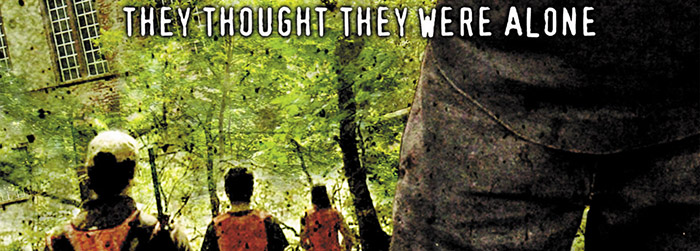

Ti West, Director — IMDB: Ti West was born on October 5, 1980 in Wilmington, Delaware, USA. He is a writer and director, known for The House of the Devil (2009), V/H/S (2012) and The Innkeepers(2011).

Larry Fessenden, Producer, “Henchmen’ —
Larry Fessenden, winner of the 1997 Someone to Watch Spirit Award, and nominee for the 2010 Piaget Spirit Award for producing, is the writer, director and editor of the award-winning art-horror trilogy HABIT (Nominated for 2 Spirit Awards), WENDIGO and NO TELLING. His recent film, THE LAST WINTER (Nominated for a 2007 Gotham Award for best ensemble cast), premiered at the 2006 Toronto Film Festival and was distributed through IFC. Fessenden directed SKIN AND BONES for NBC TV’s horror anthology FEAR ITSELF. He wrote the screenplay with Guillermo del Toro of ORPHANAGE, an English language remake of the successful Spanish film EL ORFANATO. Fessenden was awarded the 2007 Sitges Film Festival Maria Award for his work as a producer, actor and director in genre film, and he won the 2009 Golden Hammer Award for “being such an inspiring force in the industry.” In 2011, Fessenden was inducted into the “Fangoria Hall of Fame” and was honored by the UK’s Total Film as an Icon of Horror during the Frightfest Film Festival.
Fessenden has been a producer on various projects including Rick Alverson’s THE COMEDY, Kelly Reichardt’s WENDY AND LUCY (nominated for two 2009 Spirit Awards and on over 60 “Top 10 Movies of the Year” lists), Ti West’s THE HOUSE OF THE DEVIL, and forthcoming THE INNKEEPERS, Joe Maggio’s THE LAST RITES OF JOE MAY, James McKenney’s SATAN HATES YOU, and Ilya Chaiken’s LIBERTY KID. Under his low budget horror banner ScareFlix, Fessenden has produced 9 films including Jim Mickle’s STAKE LAND (winner of the 2010 Toronto Film Festival Audience Award) , Joe Maggio’s BITTER FEAST, Ti West’s THE ROOST and TRIGGER MAN and Glenn McQuaid’s I SELL THE DEAD which opened the 2009 Slamdance Film Festival where it won awards for best cinematography and best actor (Fessenden). I SELL THE DEAD won the 2008 Toronto After Dark Film Festival award for best Independent Film.
As a character actor Fessenden has appeared in numerous films, including Glenn McQuaid’s I SELL THE DEAD for which he won a special Jury prize for best performance at the 2009 Slamdance Film Festival. He has appeared in Neil Jordan’s THE BRAVE ONE, Joe Swanberg’s SILVER BULLETS, Jim Jarmusch’s BROKEN FLOWERS, Kelly Reichardt’s WENDY AND LUCY, Martin Scorsese’s BRINGING OUT THE DEAD, Steve Buscemi’s ANIMAL FACTORY, Jim Mickle’s STAKE LAND and MULBERRY STREET, and Brad Anderson’s VANISHING ON 7TH STREET and SESSION 9. Fessenden stars in HABIT, and the Sundance pictures MARGARITA HAPPY HOUR (Ilya Chaiken) and RIVER OF GRASS (Kelly Reichardt).
In the Fall of 2010 Fessenden curated and produced with Glenn McQuaid TALES FROM BEYOND THE PALE, a 10 episode audio series, Radio plays for a digital age. In 2011 He released his third rock album with the band JUST DESSERTS.
Fessenden has operated the production company Glass Eye Pix since 1985 (“one of the indie scene’s most productive and longest-running companies” — Filmmaker Magazine), with the mission of supporting individual voices in the arts.
| TRIGGER MAN (2008, CD - Jeff Grace, composer)Music from TRIGGER MAN and THE ROOST AVAILABLE THROUGH iTUNES |
 |




